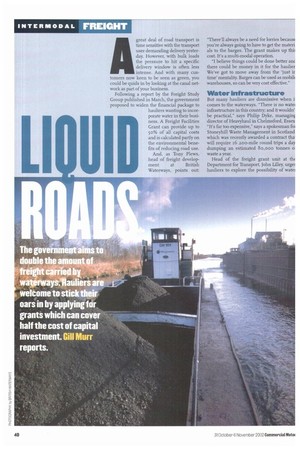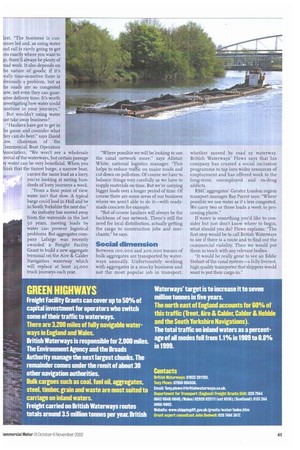A great deal of road transport is time sensitive with the
Page 40

Page 41

If you've noticed an error in this article please click here to report it so we can fix it.
transport user demanding delivery yesterday. However, with bulk loads the pressure to hit a specific delivery window is often less intense. And with many customers now keen to be seen as green, you
could be quids in by looking at the canal net work as part of your business.
Following a report by the Freight Study Group published in March, the government proposed to widen the financial package to hauliers wanting to incorporate water in their business. A Freight Facilities Grant can provide up to 50% of all capital costs and is calculated partly on the environmental benefits of reducing road use.
And, as Tony Flews, head of freight develop ment at British Waterways, points out: "There'll always be a need for lorries becaus you're always going to have to get the rnateri als to the barges. The grant makes up tin! cost. It's a multi-modal operation.
"I believe things could be done better an there could be money in it for the hauliet We've got to move away from the lust ir time' mentality. Barges can be used as mobil warehouses, so can be very cost effective."
Water infrastructure
But many hauliers are dismissive when i comes to the waterways. "There is no wate infrastructure in this country; and it wouldn' be practical," says Philip Dyke, managini director of Heavyhaul in Chelmsford, Essex "It's far too expensive," says a spokesman fo Stoneyhill Waste Management in Scotland which was recently awarded a contract tha will require 16 200-mile round trips a day dumping an estimated 80,000 tonnes o waste a year.
Head of the freight grant unit at thi Department for Transport, lohn Lilley, urge! hauliers to explore the possibility of wate
irst. "The business is cus:omer led and, as using water Ind rail is rarely going to get lou exactly where you want to pa, there'll always be plenty of 71:sad work. It also depends on he nature of goods; if it's -eally time-sensitive there is )bviously a problem, but as he roads are so congested low, not even they can guarintee delivery time. It's worth nvestigating how water could :ombitie in your journeys."
But wouldn't using water ust take away business?
"Hauliers have got to get in he game and consider what hey can do best," says David chairman of the .7ommercial Boat Operators kssociation. "We won't see a wholesale revival of the waterways, but certain passage )3! water can be very beneficial. When you hink that the tiniest barge, a narrow boat, carries the same load as a lorry, you're looking at saving hundreds of lorry journeys a week.
"From a time point of view, water isn't that slow. A typical barge could load in Hull and be in South Yorkshire the next day."
As industry has moved away from the waterside in the last 5o years, moving loads by water can present logistical problems. But aggregates company Lafarge was recently awarded a Freight Facility Grant to build a new aggregate terminal on the Aire & Calder Navigation waterway which will replace at least 2.5,000 truck journeys each year. "Where possible we will be looking to use the canal network more," says Alistair White, national logistics manager. "This helps to reduce traffic on major roads and cut down on pollution. Of course we have to balance things very carefully as we have to supply materials on time. But we're carrying bigger loads over a longer period of time. Of course there are some areas of our business where we aren't able to do it—with readymade concrete for example.
"But of course hauliers will always be the backbone of our network. There's still the need for local distribution, actually getting the cargo to construction jobs and merchants," he says.
Social dimension
Between too,000 and 200,000 tonnes of bulk aggregates are transported by waterways annually. Unfortunately working with aggregates is a mucky business and not the most popular job in transport, whether moved by road or waterway. British Waterways' Flews says that his company has created a social inclusion programme to tap into wider resources of employment and has offered work to the long-term unemployed and ex-drug addicts.
RMC aggregates' Greater London region transport manager Ray Parrot says: "Where possible we use water as it's less congested. We carry two or three loads a week to processing plants."
If water is something you'd like to consider but just don't know where to begin, what should you do? Plews explains: "The first step would be to call British Waterways to see if there is a route and to find out the commercial viability. Then we would put them in touch with any relevant bodies.
"It would be really great to see an Eddie Stobart of the canal system—a fully liveried, high quality transporter that shippers would want to put their cargo in."




























































































































































